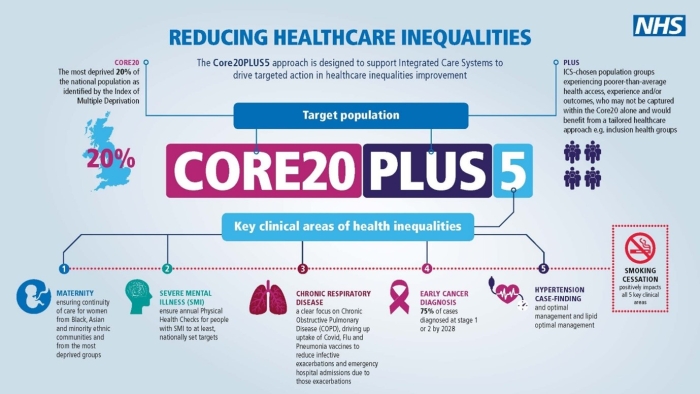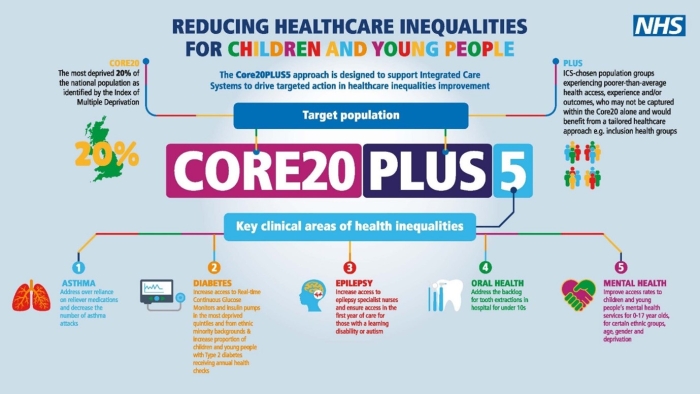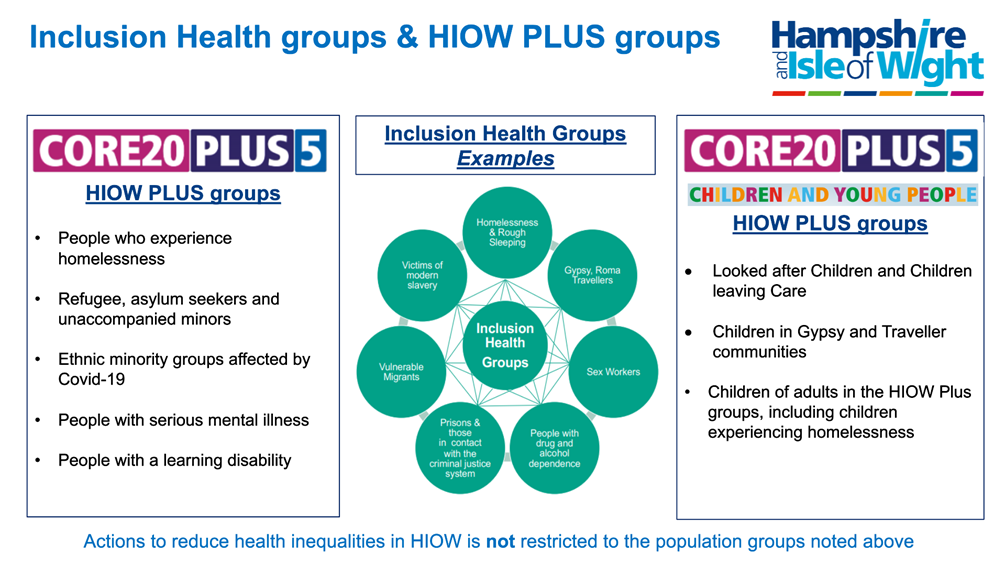Core20PLUS5 is a national NHS England approach to inform action to reduce healthcare inequalities at both national and system level. The approach defines a target population - the 'Core20PLUS' - and identifies '5' focus clinical areas requiring accelerated improvement.
The approach, which initially focussed on healthcare inequalities experienced by adults, has now been adapted to apply to children and young people.


Core20
The most deprived 20% of the national population as identified by the national Index of Multiple Deprivation (IMD). The IMD has seven domains with indicators accounting for a wide range of social determinants of health.
PLUS
PLUS population groups should be identified at a local level. Populations we would expect to see identified are ethnic minority communities; people with a learning disability and autistic people; people with multiple long-term health conditions; other groups that share protected characteristics as defined by the Equality Act 2010; groups experiencing social exclusion, known as inclusion health groups coastal communities (where there may be small areas of high deprivation hidden amongst relative affluence).
Inclusion health groups include: people experiencing homelessness, drug and alcohol dependence, vulnerable migrants, Gypsy, Roma and Traveller communities, sex workers, people in contact with the justice system, victims of modern slavery and other socially excluded groups.
5
There are five clinical areas of focus which require accelerated improvement. Governance for these five focus areas sits with national programmes; national and regional teams coordinate activity across local systems to achieve national aims.
1. Maternity
- Ensuring continuity of care for women from Black, Asian and minority ethnic communities and from the most deprived groups. This model of care requires appropriate staffing levels to be implemented safely.
2. Severe mental illness (SMI)
-
Ensure annual physical health checks for people with SMI to at least nationally set targets.
3. Chronic respiratory disease
-
A clear focus on Chronic Obstructive Pulmonary Disease (COPD) driving up uptake of COVID, flu and pneumonia vaccines to reduce infective exacerbations and emergency hospital admissions due to those exacerbations.
4. Early cancer diagnosis
-
75% of cases diagnosed at stage 1 or 2 by 2028.
5. Hypertension case-finding and optimal management and lipid optimal management
-
To allow for interventions to optimise blood pressure and minimise the risk of myocardial infarction and stroke.
Please see the supporting document for further information.
Core20
See above 'Outline of Core20PLUS5 approach for adults'
PLUS
See above 'Outline of Core20PLUS5 approach for adults'
5
There are five clinical areas of focus which require accelerated improvement. Governance for these five focus areas sits with national programmes; national and regional teams coordinate activity across local systems to achieve national aims.
1. Asthma
- Address over reliance on reliever medications and decrease the number of asthma attacks.
2. Diabetes
-
Increase access to real-time continuous glucose monitors and insulin pumps in the most deprived quintiles and from ethnic minority backgrounds and increase proportion of children and young people with Type 2 diabetes receiving annual health checks.
3. Epilepsy
-
Increase access to epilepsy specialist nurses and ensure access in the first year of care for those with a learning disability or autism.
4. Oral health
-
Address the backlog for tooth extractions in hospital for the under 10s.
5. Mental Health
-
Improve access rates to children and young people’s mental health services for 0-17 year olds, for certain ethnic groups, age, gender and deprivation.
PLUS population groups are identified at a local level, both for adults and CYP.
The Hampshire and Isle of Wight Prevention and Inequalities Board agreed the intial focus for Hampshire and Isle of Wight Core20PLUS5 PLUS groups, many of which overlap into inclusion health groups. There will also be cross-over between PLUS groups.
Our HIOW PLUS population groups are not static and can be changed over time, depending on need, what our local data may indicate, and where gaps are.

People in inclusion health groups experience a range of poor health outcomes and tend to have shorter life expectancies than the general population, which is why the work to reduce health inequalities is so important.
Five e-learning modules have been launched to support systems in the implementation of Core2PLUS5. The e-learning modules cover narrowing health inequalities in hypertension, early cancer diagnosis, chronic respiratory disease, maternity and severe mental illness. The modules are aimed at anyone with a responsibility or interest in reducing health inequalities, especially those working to deliver services in the five clinical priority areas. Each module takes around 30 minutes to complete. The modules are available for free on the Health Education England e-learning for health platform.